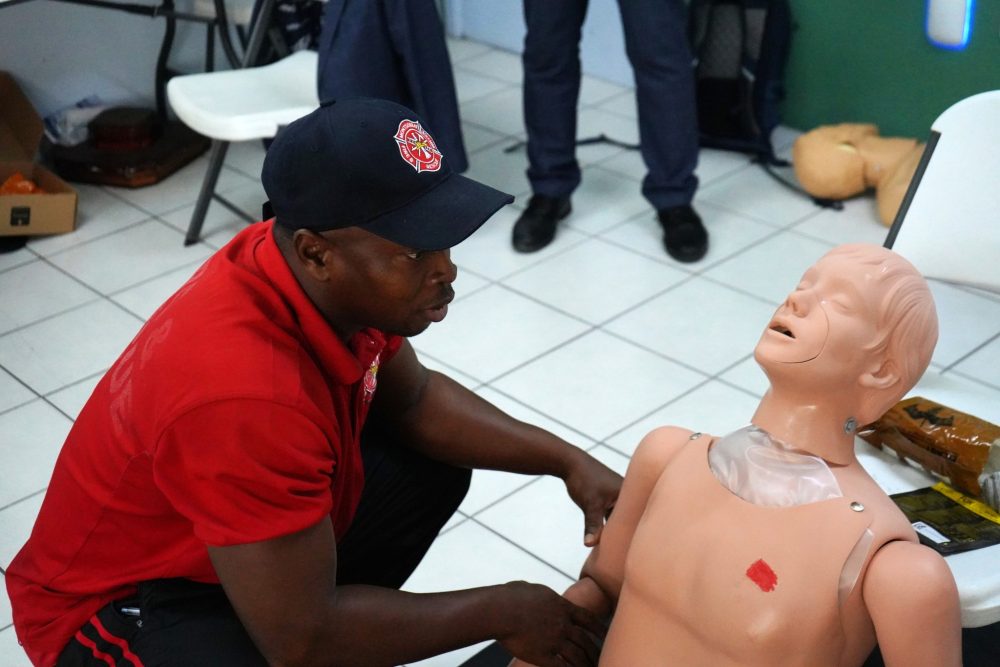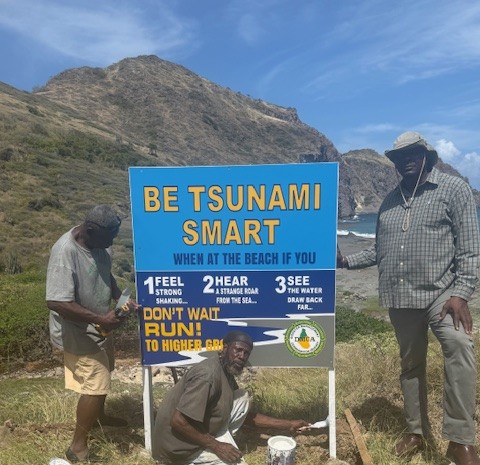
Captain Jayson Horadam, George Ryan, Deslane Joseph) (© Jayson Horadam)
Twenty-four participants, including one officer from Montserrat, took part in a training to enhance the enforcement of marine protected areas in the Caribbean. The weeklong workshop was held in Saint Lucia from 12 to 15 September and focused on best practices for surveillance techniques, evidence handling, prosecutions, and reporting.
Captain Jayson Horadam, the principal instructor of this course and President of MPA Enforcement International is a regional natural resource law enforcement expert from Florida. He explained, “The workshop is a 40-hours course comprised of classroom, homework and most importantly, hands on, in the field training. It is designed to produce three positive results. First, it provides basic skills and knowledge of law enforcement to the men and women tasked with protection and enforcement in marine protected areas. Second, it trains these guardians to be ambassadors and educators while protecting the environment. For those not wishing to follow rules and regulations, the Rangers now have the ability to take professional enforcement actions. Third, the workshop brings together different agencies in Saint Lucia and the region and demonstrates the need for partnerships and teamwork which will be necessary to ensure the natural resources will be protected and preserved.”

The course, organized by MPA Enforcement International and the Soufriere Marine Managed Area, attracted participants from Antigua and Barbuda, Montserrat and Saint Lucia. Participants represented the Barbuda Fisheries Service, the Royal Police Force of Antigua & Barbuda, Montserrat, and Saint Lucia, as well as the St Lucia’s Department of Fisheries, Air & Seaport Authority, the National Trust, Customs & Excise, the Praedial Larceny Unit, and the Soufriere Marine Management Association.
Saint Lucia and Antigua & Barbuda already have marine sanctuaries in place that span over 180 square kilometers.

“Marine protected areas are important to ensure the sustainable use of ocean resources” says Kathryn Mengerink, Executive Director of the Waitt Institute.” Mengerink adds “Through the Blue Halo Initiative, Barbuda established a network of protected areas that surround the island. Key to successful implementation is compliance, which in turn requires adequate enforcement to deter bad actors who evade the law and undermine resource management.” The Blue Halo Initiative is a partnership between the Waitt Institute and the Barbuda Council to develop sustainable ocean policies.
Constable Nigel Joseph from the Barbuda Police force was one of the course participants. He said “The training gave us basic knowledge to enforce fisheries laws. We learned what to look for when we go out on patrols.” He added “For me, the most useful part of the training was learning the correct way to carry out checks on different vessels. I also learned that it is not always about bringing a charge, but to educate the person who may know about the fisheries laws.”
Efforts to expand marine spatial planning including marine protection in the Eastern Caribbean are underway: The Government of Montserrat is currently working with the Waitt Institute through Blue Halo Montserrat to design and implement a sustainable ocean policy focused on marine spatial planning and fisheries management for the island.
“Over the past 18 months, we conducted extensive research to identify marine management priorities for Montserrat” says Robin Ramdeen, Site Manager for Blue Halo Montserrat. She adds “We will deliver our policy recommendations to the Government in November, and look forward to working with our partners to identify and implement the most feasible recommendations. Although the establishment of marine protected areas will happen further down the road, we are excited that the Royal Montserrat Police Service is participating in this course to develop enforcement capacity for the future.”
This course is made possible through support from the National Fish and Wildlife Foundation to enhance enforcement capacity for coral reef management in the Caribbean.
Discover more from Discover Montserrat
Subscribe to get the latest posts sent to your email.



